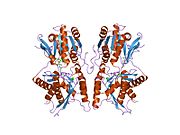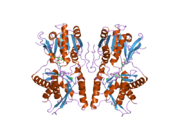Natriuretic peptide receptor C/guanylate cyclase C (atrionatriuretic peptide receptor C), also known as NPR3, is an atrial natriuretic peptide receptor. In humans it is encoded by the NPR3 gene.[5]
Function
The family of natriuretic peptides elicit a number of vascular, renal, and endocrine effects that are important in the maintenance of blood pressure and extracellular fluid volume. These effects are mediated by specific binding of the peptides to cell surface receptors in the vasculature, kidney, adrenal, and brain.[5]
See also
References
- ^ a b c GRCh38: Ensembl release 89: ENSG00000113389 – Ensembl, May 2017
- ^ a b c GRCm38: Ensembl release 89: ENSMUSG00000022206 – Ensembl, May 2017
- ^ "Human PubMed Reference:". National Center for Biotechnology Information, U.S. National Library of Medicine.
- ^ "Mouse PubMed Reference:". National Center for Biotechnology Information, U.S. National Library of Medicine.
- ^ a b "Entrez Gene: NPR3 natriuretic peptide receptor C/guanylate cyclase C (atrionatriuretic peptide receptor C)".
Further reading
- Fox AA, Collard CD, Shernan SK, et al. (2009). "Natriuretic peptide system gene variants are associated with ventricular dysfunction after coronary artery bypass grafting". Anesthesiology. 110 (4): 738–47. doi:10.1097/ALN.0b013e31819c7496. PMC 2735337. PMID 19326473.
- Moffatt P, Thomas G, Sellin K, et al. (2007). "Osteocrin is a specific ligand of the natriuretic Peptide clearance receptor that modulates bone growth" (PDF). J. Biol. Chem. 282 (50): 36454–62. doi:10.1074/jbc.M708596200. PMID 17951249. S2CID 7185411.
- Pitzalis MV, Sarzani R, Dessì-Fulgheri P, et al. (2003). "Allelic variants of natriuretic peptide receptor genes are associated with family history of hypertension and cardiovascular phenotype". J. Hypertens. 21 (8): 1491–6. doi:10.1097/00004872-200308000-00012. hdl:11566/50999. PMID 12872042. S2CID 40988095.
- Fan D, Bryan PM, Antos LK, et al. (2005). "Down-regulation does not mediate natriuretic peptide-dependent desensitization of natriuretic peptide receptor (NPR)-A or NPR-B: guanylyl cyclase-linked natriuretic peptide receptors do not internalize". Mol. Pharmacol. 67 (1): 174–83. doi:10.1124/mol.104.002436. PMID 15459247. S2CID 53520.
- He XL, Chow DC, Martick MM, Garcia KC (2001). "Allosteric activation of a spring-loaded natriuretic peptide receptor dimer by hormone". Science. 293 (5535): 1657–62. Bibcode:2001Sci...293.1657H. doi:10.1126/science.1062246. PMID 11533490. S2CID 6030635.
- Soranzo N, Rivadeneira F, Chinappen-Horsley U, et al. (2009). Visscher PM (ed.). "Meta-analysis of genome-wide scans for human adult stature identifies novel Loci and associations with measures of skeletal frame size". PLOS Genet. 5 (4): e1000445. doi:10.1371/journal.pgen.1000445. PMC 2661236. PMID 19343178.
- Olsen JV, Blagoev B, Gnad F, et al. (2006). "Global, in vivo, and site-specific phosphorylation dynamics in signaling networks". Cell. 127 (3): 635–48. doi:10.1016/j.cell.2006.09.026. PMID 17081983. S2CID 7827573.
- He XL, Dukkipati A, Garcia KC (2006). "Structural determinants of natriuretic peptide receptor specificity and degeneracy". J. Mol. Biol. 361 (4): 698–714. doi:10.1016/j.jmb.2006.06.060. PMID 16870210.
- Rubattu S, Stanzione R, Di Angelantonio E, et al. (2004). "Atrial natriuretic peptide gene polymorphisms and risk of ischemic stroke in humans". Stroke. 35 (4): 814–8. doi:10.1161/01.STR.0000119381.52589.AB. PMID 15017020.
- Iemitsu M, Maeda S, Otsuki T, et al. (2008). "Arterial stiffness, physical activity, and atrial natriuretic Peptide gene polymorphism in older subjects". Hypertens. Res. 31 (4): 767–74. doi:10.1291/hypres.31.767. PMID 18633189.
- Dickey DM, Yoder AR, Potter LR (2009). "A familial mutation renders atrial natriuretic Peptide resistant to proteolytic degradation". J. Biol. Chem. 284 (29): 19196–202. doi:10.1074/jbc.M109.010777. PMC 2740543. PMID 19458086.
- Gratacòs M, Costas J, de Cid R, et al. (2009). "Identification of new putative susceptibility genes for several psychiatric disorders by association analysis of regulatory and non-synonymous SNPs of 306 genes involved in neurotransmission and neurodevelopment". Am. J. Med. Genet. B Neuropsychiatr. Genet. 150B (6): 808–16. doi:10.1002/ajmg.b.30902. PMID 19086053. S2CID 44524739.
- Aoi N, Soma M, Nakayama T, et al. (2004). "Variable number of tandem repeat of the 5'-flanking region of type-C human natriuretic peptide receptor gene influences blood pressure levels in obesity-associated hypertension". Hypertens. Res. 27 (10): 711–6. doi:10.1291/hypres.27.711. PMID 15785005.
- Anand-Srivastava MB (2005). "Natriuretic peptide receptor-C signaling and regulation". Peptides. 26 (6): 1044–59. doi:10.1016/j.peptides.2004.09.023. PMID 15911072. S2CID 6734231.
- Estrada K, Krawczak M, Schreiber S, et al. (2009). "A genome-wide association study of northwestern Europeans involves the C-type natriuretic peptide signaling pathway in the etiology of human height variation". Hum. Mol. Genet. 18 (18): 3516–24. doi:10.1093/hmg/ddp296. PMC 2729669. PMID 19570815.
- Burgess MD, Moore KD, Carter GM, et al. (2009). "C-type natriuretic peptide receptor expression in pancreatic alpha cells". Histochem. Cell Biol. 132 (1): 95–103. doi:10.1007/s00418-009-0591-3. PMID 19352691. S2CID 9116972.
- Vassalle C, Andreassi MG, Prontera C, et al. (2007). "Influence of ScaI and natriuretic peptide (NP) clearance receptor polymorphisms of the NP System on NP concentration in chronic heart failure". Clin. Chem. 53 (11): 1886–90. doi:10.1373/clinchem.2007.088302. PMID 17890443.
- Lee JK, Kim HT, Cho SM, et al. (2003). "Characterization of 458 single nucleotide polymorphisms of disease candidate genes in the Korean population". J. Hum. Genet. 48 (5): 213–6. doi:10.1007/s10038-003-0011-9. PMID 12768436.
- van den Akker F (2001). "Structural insights into the ligand binding domains of membrane bound guanylyl cyclases and natriuretic peptide receptors". J. Mol. Biol. 311 (5): 923–37. doi:10.1006/jmbi.2001.4922. PMID 11556325.
- He XL, Dukkipati A, Wang X, Garcia KC (2005). "A new paradigm for hormone recognition and allosteric receptor activation revealed from structural studies of NPR-C". Peptides. 26 (6): 1035–43. doi:10.1016/j.peptides.2004.08.035. PMID 15911071. S2CID 28281513.
External links
- NPR2+protein,+human at the U.S. National Library of Medicine Medical Subject Headings (MeSH)
This article incorporates text from the United States National Library of Medicine, which is in the public domain.






Recent Comments